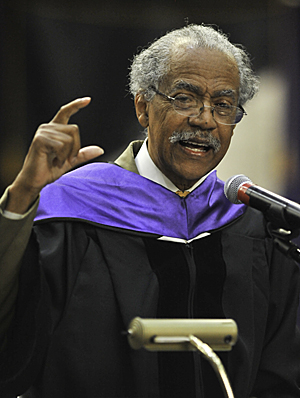
Rev. Samuel Billy Kyles addresses the Class of 2012 during New Mexico Highlands’ Commencement Ceremony May 12.
Las Vegas, N.M. — Hold fast to your dreams, a prominent civil rights leader told graduates at the New Mexico Highlands University commencement.
Rev. Samuel Billy Kyles spoke to the graduates and their families May 12 at the university’s Wilson Complex on its main campus. Kyles was at Martin Luther King’s side when he was assassinated.
“I want to tell you about the power of a dream,” Kyles said. “Dreams make the world go round. All of us have dreams, and some of us have lived our dream and started some more.
“If your dreams die, you are like a broken-winged bird that cannot fly,” Kyles said, quoting American poet and novelist Langston Hughes.
“Think about all these dreamers sitting in this building now. They will be doing astonishing things,” Kyles said.
Kyles, 77, told the graduates not to expect everyone to embrace their dream, noting that the Wright brothers were considered unrealistic dreamers when they decided to invent an airplane.
He added, “In less than 150 years we have achieved the dream of an African American president.”
As a young Baptist minister in Memphis, Tenn., in the early 1960s, Kyles became one of the key strategists for the growing civil rights movement to end segregation in the south.
In 1959, he was 25 and he became the first — and only – pastor of the Monumental Baptist Church in Memphis, where he continues to preach to this day. At the time, everything in Memphis was segregated, including schools, churches, unions, movie theaters, and restaurants.
Kyles rolled up his sleeves and went to work organizing nonviolent protests, which included spending jail time after being arrested for sitting in the front of a Memphis bus in the whites-only section.
“Working in the civil rights movement has always been an extension of my ministry,” Kyles said.
“Rev. Kyles has spent a lifetime as a major leaguer in the civil rights movement,” said Highlands University President Jim Fries. “He has received several major honors and awards, and is a highly regarded national and international speaker. It is truly an honor to have Rev. Kyles with us here today.”
In 2010, Kyles was named to the International Civil Rights Walk of Fame, in 2009 he received the Ford Freedom Legacy Award, and in 2000 he was tapped for the City of Memphis Humanitarian Award, to name a few.
Kyles worked alongside King and other prominent civil rights leaders.
“Look at how young Martin Luther King was when he died, just 39. He was living his dream of helping people. He was never poor himself but he always wanted to help the poor. And who was more poor than the Memphis sanitation workers?” Kyles said.
King was in Memphis on April 3, 1968 to support striking sanitation workers. He delivered his famous “Mountaintop” speech that night to a packed Mason Temple. It was his last speech
The next evening, King was in his room at the Lorraine Hotel talking with Kyles and Rev. Ralph Abernathy, another influential Baptist minister and civil rights leader.
“We were just three preachers in a room talking preacher talk. Even though Martin had said before that the rumor was out that he’d be killed, we had no way of knowing that this would be our last gathering,” Kyles said.
Kyles joined King on the balcony of Room 306 for more conversation. King leaned over the railing to talk to Rev. Jesse Jackson in the courtyard. A shot rang out.
“Martin Luther King could have been anything, even president. Yet there he was, dying on a concrete balcony in a cheesy hotel. When they shot Martin they said, ‘We will shoot this dreamer and see what happens to his dream.’ I must tell you that you can kill the dreamer but no, no, no you cannot kill the dream,” Kyles said.
He said he wondered for years why he was there at that tragic moment.
“Over time, God revealed the answer to me and it was a relief. Crucifixions need a witness. A witness who has information and does not share it is of no consequence. I needed to be a witness to continue Martin’s legacy.” Kyles said.
Kyles, along with other civil rights leaders and activists, continued nonviolent protests and other efforts to end segregation. Ultimately, the movement was successful.
In 1971, Kyles was a founding board member when Jackson founded PUSH, People United to Save Humanity. Originally dedicated to improving economic conditions in black communities across the nation, PUSH expanded into social and political development.
Kyles was a delegate to the first African National Congress. In 1994, he served as a monitor in South Africa’s first multiracial election. U.S. President Bill Clinton appointed Kyles to serve on the Advisory Committee for Religious Freedom Abroad.
Kyles was instrumental in establishing the National Civil Rights Museum, which opened in 1991 at the Lorraine Motel. He still serves on the museum’s board of directors and visits the museum weekly to greet visitors.
In 2010, Jill Baskerville became the catalyst for Kyles speaking at Highlands when she met him at the museum. She is a visiting professor of social and behavioral sciences.
“I introduced myself and he asked where I was from,” Baskerville said. “I said I taught at New Mexico Highlands University — a place of educational opportunity for many first-generation college students. He is very kind and was genuinely interested in our small university.”
